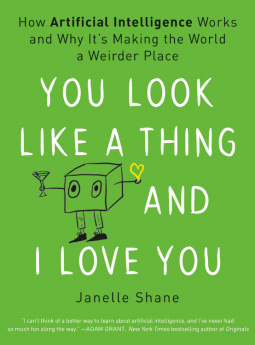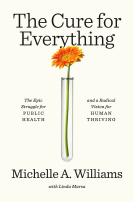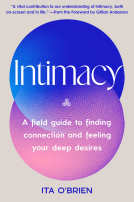
You Look Like a Thing and I Love You
How Artificial Intelligence Works and Why It's Making the World a Weirder Place
by Janelle Shane
This title was previously available on NetGalley and is now archived.
Send NetGalley books directly to your Kindle or Kindle app
1
To read on a Kindle or Kindle app, please add kindle@netgalley.com as an approved email address to receive files in your Amazon account. Click here for step-by-step instructions.
2
Also find your Kindle email address within your Amazon account, and enter it here.
Pub Date Nov 05 2019 | Archive Date Dec 03 2020
Little, Brown and Company | Voracious
Description
Available Editions
| EDITION | Other Format |
| ISBN | 9780316525244 |
| PRICE | $28.00 (USD) |
| PAGES | 224 |
Average rating from 22 members
Featured Reviews
 Bookseller 545305
Bookseller 545305
I absolutely LOVED this book. I have been following Janelle Shane's blog, AI Weirdness, for a few years now and was so excited when she announced a book's coming out, and it definitely did not disappoint. It is simultaneously laugh-out-loud hilarious, profound, critical, and comprehensive in its analysis of what AIs can and cannot do.
Here are just some of the things you'll find in this book:
- a thorough description of the entire process of AI training, and them consequently forgetting their training (if need to. Or not)
- humans pretending to be AI
- commentary on the built-in bias of AIs and real-life examples on what is being done to fix it (or to deny it)
- hilarious illustrations
- examples of AI-generated flavors of ice cream and BuzzFeed article titles that will make you hiccup from laughter (seriously, who doesn't want to read about "25 unfortunate cookie perfomances from around the world" and learn "43 quotes guaranteed to make you a mermaid immediately")
- comprehendible but not patronizing language, no jargon that could intimidate an amateur
- and so much more!
This is the best non-fiction book I've read this year and I cannot wait to recommend it to everyone!
I have to be very careful when I check Janelle Shane's AI Weirdness blog, because it has more than once left me laughing so much I couldn't breathe with its lists of an artificial intelligence's efforts to generate new entries in a given category – if you've somehow not seen any, I'd particularly recommend the paint colours and the names for guinea pigs. This book does draw from those lists, not least in the title – an AI-suggested chat-up line, and TBH one which would probably work on me. But more than the blog it tries to restrain itself to using them as examples, while educating the general reader in how AI works in the real world, as against the bolder projections of science fiction (a category which includes much mainstream media coverage of AI). As Shane is at pains to remind us, for the moment most AI has approximately the cognitive capability of a worm, rather than Skynet, and when it goes wrong even the dangers are more likely to stem from stupidity than omniscience. That can be human stupidity too, though, whether in terms of machines replicating the biases of the lamentable species which created them, or being given a bad initial dataset from which to learn, or simply not having the nature of the question properly spelled out for them. Google researcher Alex Irpan* says he's found it helpful to picture AI as a a demon deliberately trying to misinterpret any instructions it's given, which while amusing is also one of the more alarming moments in the book – see also the bit where the NPCs in Oblivion had to be toned down a bit because they were getting up to the sort of mischief only players were supposed to be able to do. More often, though, this results in robots which fall over because it's easier than walking, or conclude that the best way to stop a car crashing is to immobilise it, or just start claiming there are giraffes everywhere (a more common failure mode than you might have expected). Although I didn't find the algorithmically created recipes significantly more nonsensical than the ones humans perpetrate, and given my feelings on sport, I love that one task simple enough for them to reliably handle is match reports. I may or may not remember the difference between a Markov chain and a GAN by the end of next month (assuming, of course, that technological civilisation in Britain lasts beyond the end of next month anyway), but the general understanding of how to spot ludicrous overclaiming for the powers of AI, and why some tasks really don't suit it, will definitely remain. I also have a newfound respect for their determination to solve many problems either by strategic laziness, or rewriting the laws of the universe.
*Does nominative determinism include initials too? There's also a Karl Sims working on simulations.
(Netgalley ARC)
 Reviewer 41812
Reviewer 41812
A fun, irreverent guide to the world of artificial intelligence from the woman behind the fantastic AI Weirdness blog. The book's central premise can be summed up in a sentence: artificial intelligence is more widespread than we think... but it's also pretty stupid. Hence the many funny, charming and even cute examples of machine-generated oddness throughout: recipes that call for 'liquid toe water'; a list of Halloween costumes that includes 'Panda Clam' and 'Failed Steampunk Spider' (I actually want to see that one); and the book's title, which was the result of an AI being tasked with devising chat-up lines. Shane's light-hearted style is very accessible – there are loads of laugh-out-loud anecdotes, but you'll learn quite a bit too.
 Librarian 431790
Librarian 431790
This is one the best book I've ever read about AI. it's well researched and humorous at the same time.
I loved the humour, the style of writing and the clarity of the explanations.
I will surely visit the author's blog and look forward to reading her further books.
Highly recommended
Many thanks to the publisher and Netgalley for this ARC, all opinions are mine.
 Mike D, Reviewer
Mike D, Reviewer
Well, first of all, You Look Like A Thing and I Love You is a pick up line AI came up with and as far as pick up lines go it’s actually pretty good. And hilarious. Pretty good and hilarious is an apt way to describe this entire book, actually. Especially if, like me, you’re interested in AI and find autocorrect hysterical. Because, as it turns out, advancements in robotics, specifically robotic intelligence are nowhere near as…well, as advanced as you might think. Or hope. Which, personally, I find very sad, I ‘m always hoping and wishing for some artificially intelligent company, since the alternative leaves so much to be desired. But no, feet are being dragged and there are still so many limitations. To be fair, we can get AI to do narrow limited tasks pretty well. But independence of thinking on the Turing Test passing level is still but a fantasy, mostly. This book started off as a blog and I’m so glad it was turned into a book, because I don’t read blog, but a book with this title, description and cover is certain to grab my attention. And so chapter by chapter the author subjects AI to test after test to produce recipes, pick up lines and dessert flavors. The results are laugh out loud funny, I don’t think I’ve ever laughed that much while reading a work of nonfiction. The robots are pretty adorable, much like the author’s accompanying drawings. And it isn’t just fun and games either, you do get a fair amount of information and science behind the AI development, which I found very interesting. Robots, much like us, can be quirky, random and have a penchant for shortcuts. They are just not quite ready yet for the complexity of tasks science fiction has them perform. That’s pretty much the gist of the book, it’s the sort of thing where you can read the final summarizing chapter and get it, but if you read the entire thing, you get the lovely drawings and the comedy, so it’s totally worth it. Plus it’s a very quick read. Thoroughly entertaining book, albeit sad on a personal level for someone who can’t wait for sci fi future with super intelligent robots. Even if they might take over the world. Recommended. Thanks Netgalley.
 Janet P, Reviewer
Janet P, Reviewer
An absolutely delightful book about Artificial Intelligence,how it works, where its shortcomings are, and what the realistic expectations are. I loves the way humor did such a fantastic way of illustrating the points.
One of the best books on AI I have read..
This book isn't for everyone, but it is for people looking at our own future with AI. So, I guess it is for everyone.
This book reads easily, complex computer science is presented at a layman's level without sounding condescending... all-around a well written book.
Full on anecdotes to make (what could be) a dry subject funny at times, there are plenty of real-world examples of AI effecting our lives today.
**I received this book from NetGalley in exchange for an honest review.


















